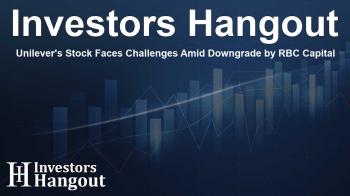Unilever's Stock Faces Challenges Amid Downgrade by RBC Capital

Unilever Stock Faces Downgrade by RBC Capital Markets
Shares of Unilever Plc (LON: ULVR) have recently faced a downturn following a decision by RBC Capital Markets to downgrade the stock to 'underperform'. This decision has stemmed from concerns regarding the company's ability to maintain its recent growth trajectory and achieve aggressive targets set forth by management.
Performance and Analyst Insights
Notably, Unilever's stock enjoyed a significant year in 2024, outperforming the MSCI European Consumer Staples Index by 32%. However, RBC analysts James Edwardes Jones and Wassachon Udomsilpa have expressed skepticism about Unilever’s capability to reach its objective of 2% volume growth. This is particularly concerning given the company's ongoing operational restructuring and recent portfolio adjustments.
Market Position and Competitive Landscape
The analysts highlighted several critical elements contributing to their downgrade. Despite a robust product portfolio, Unilever is not perceived as dominant when placed alongside competitors such as Nestlé. The report noted that Unilever lacks market leadership in numerous categories, a situation exacerbated by the divestment of its ice cream division, a key player in its competitive framework.
Growth Challenges and Historical Performance
With the divestment, Unilever has diminished its leadership role in approximately half of its business segments compared to previous standings. Furthermore, volume growth poses a significant challenge, with the company averaging under 1% annual growth since 2014. The analysts questioned the practicality of Unilever achieving its targeted growth, especially given historical hurdles and a lack of signs that emerging markets will significantly contribute to overcoming these obstacles.
Currency Impacts and Investment Concerns
Despite Unilever’s considerable exposure to emerging markets, RBC pointed out that currency depreciations in these regions have historically negated substantial volume growth. The analysts scrutinized the company’s capital expenditure, asserting that it remains considerably lower than that of its competitors.
Need for Increased Capex
Recent periods have seen favorable gross margins for Unilever; however, the investment in sustainable, long-term growth seems insufficient. The analysts articulated that Unilever has markedly under-invested in capex, and a notable increase is necessary if the company is to hope for achieving its 2% volume growth target.
Restructuring Costs and Brand Focus
Compounding these challenges, RBC highlighted that restructuring costs, which are excluded from Unilever's underlying profit calculations, adversely affect the quality of earnings reported. The organization's strategy prioritizing its 30 “Power Brands” and 24 significant markets was recognized as prudent. However, there are concerns that this strategic focus may lead to the neglect of the remaining 370 brands and 100 markets, which together constitute a significant part of Unilever's overall business.
Revised Price Target and Market Outlook
RBC’s downgrade is accompanied by a reduction in its price target for Unilever, lowering it from GBp 4,800 to GBp 4,000. This new valuation indicates limited upside potential for the stock, especially in light of its already stretched valuation when compared to historical norms and peers like Nestlé.
Frequently Asked Questions
What was the recent downgrade by RBC regarding Unilever?
RBC Capital Markets downgraded Unilever to 'underperform' due to concerns over sustaining growth and achieving volume targets.
How did Unilever perform in 2024?
Unilever significantly outperformed the MSCI European Consumer Staples Index by 32% in 2024.
What are some concerns raised by RBC analysts?
Analysts expressed concerns about Unilever's capacity for 2% volume growth and the impact of recent divestitures on market leadership.
How has the company's capital expenditure been scrutinized?
RBC noted that Unilever's capital expenditure levels are much lower compared to its competitors, hindering long-term growth potential.
What changes were made to RBC's price target for Unilever?
RBC reduced its price target for Unilever from GBp 4,800 to GBp 4,000, indicating limited upside potential for investors.
About Investors Hangout
Investors Hangout is a leading online stock forum for financial discussion and learning, offering a wide range of free tools and resources. It draws in traders of all levels, who exchange market knowledge, investigate trading tactics, and keep an eye on industry developments in real time. Featuring financial articles, stock message boards, quotes, charts, company profiles, and live news updates. Through cooperative learning and a wealth of informational resources, it helps users from novices creating their first portfolios to experts honing their techniques. Join Investors Hangout today: https://investorshangout.com/
Disclaimer: The content of this article is solely for general informational purposes only; it does not represent legal, financial, or investment advice. Investors Hangout does not offer financial advice; the author is not a licensed financial advisor. Consult a qualified advisor before making any financial or investment decisions based on this article. The author's interpretation of publicly available data shapes the opinions presented here; as a result, they should not be taken as advice to purchase, sell, or hold any securities mentioned or any other investments. The author does not guarantee the accuracy, completeness, or timeliness of any material, providing it "as is." Information and market conditions may change; past performance is not indicative of future outcomes. If any of the material offered here is inaccurate, please contact us for corrections.
